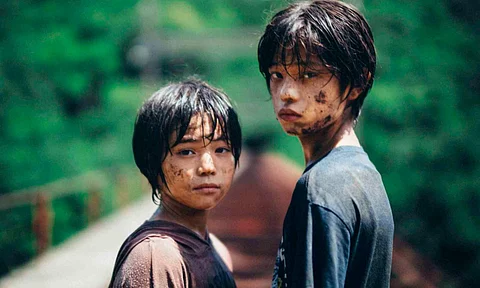

There’s a poignant scene in Hirokazu Kore-eda’s Monster (Japanese title Kaibutsu) in which the young protagonist Mugino Minato (Soya Kurokawa) is advised by the principal of his elementary school, Fushimi Makiko (Yuko Tanaka) on how to use a trumpet to resolve his troubles: “Whatever you can’t tell anyone, blow it away.” A bit like Chow Mo-wan (Tony Leung) confessing his love for Su Li-zhen (Maggie Cheung) in the hollow of the tree in Angkor Wat.
Kore-eda designs the interaction like a dialogue across generations with parallel tales of secrets, lies, and guilt driving the lives of both the adult and the child. Beyond age and time, at every stage, there will be a sense of irresolution staring back at individuals just as there will be the hope that “happiness is something anyone can have”. Life is essentially always in formation. It’s one of the many strands about being and becoming that run through Monster, competing for Palme d’Or at Cannes. It had its world premiere at the festival on May 17.
The film marks a welcome, if not entirely satisfying, return for Kore-eda to his roots in Japan after taking detours into South Korea (Broker) and France (The Truth).
It also marks a move back to working on another writer’s screenplay after his fiction feature debut with Maborosi. For his 16th feature film, Kore-eda collaborates with screenplay writer Yuji Sakamoto. While the story itself focuses on his familiar, simple, humanist concerns—relationships, marriage, parenthood, childhood, family, the conformists as opposed to the outliers, and death, loss, and remembrance—it’s the labyrinthine narrative, designed by Sakamoto that marks a departure and is bound to leave the house divided. Is it truly dense, deep, and profound, or needlessly manipulative, contrived, convoluted, and perplexing? The jury is still out.
Saori (Sakura Ando) is worried about the behavioral changes in her son Minato, and decides to discuss it at his school only to discover that his teacher Hori (Eita Nagayama) might be the root of all the troubles. But nothing is what it seems. Instead of being bullied by the teacher, Minato is accused of bullying classmate Yori Hoshikawa (Hinata Hiiragi) while Hori becomes the Fall Guy.
As Monster takes us back and forth in time, making us see the same situations—be it a burning building or a typhoon, or an injured earlobe—from the perspective of the mother, the teacher, and the child, the truth takes on a whole new meaning. In a Rashomon-like scenario, the control is in the hands of the maker, and it’s selective—what you get to see or not and at what point in time. It is for the audience, as it goes about connecting the dots, to find things provoking or exasperating, or both.
What starts as an easy-paced, gentle contemplative narrative about a single mother and son soon starts acquiring uneasy, sinister shades, tension gets built incrementally as the story flits between a thriller that keeps you guessing and horror that talks of your deepest anxieties and concerns like broken homes, dysfunctional families, abused children, paranoid parenting, crimes of innocence, self-harm, bullying—all the abnormal that often gets cloaked in normalcy. It’s about the various kinds of monsters lurking out there, but more so about the monster each one of us carries within. Ryuichi Sakamoto’s plaintive piano pieces beautifully underscore the pathos in this implicit turbulence.
The overarching theme eventually is all about fathers and sons, losses and betrayals, fear of abandonment by adults, and of separation from loved ones. It explains the pretenses and compulsions of Minato and Yori and lends their bonding a poignancy even as the film shifts shape to become all about the cruelty of conformism and the dangers in defying the norms, being quirky and “different’, especially for a child. While children’s compulsions get explained, question marks loom large on the mother, teacher, and principal’s impulses. Their stories needed better grounding than just being the ground on which to build those of the kids.
Many in Cannes might end up seeing Kurokawa and Hiiragi as this year’s Eden Dambrine (Leo) and Gustav De Waele (Remi). Like the two in Lukas Dhont’s Close, they deliver refreshingly candid yet nuanced performances. A case of Kore-eda’s incredible felicity in handling child actors, or perhaps the kids challenging and inspiring Kore-eda yet again.